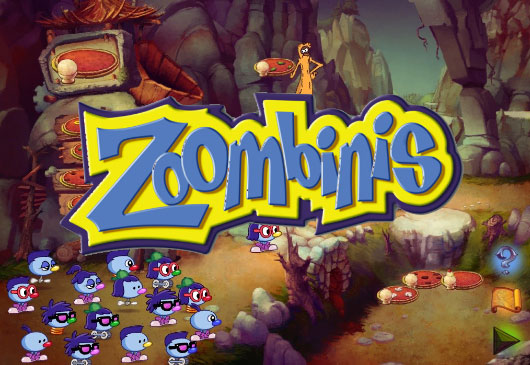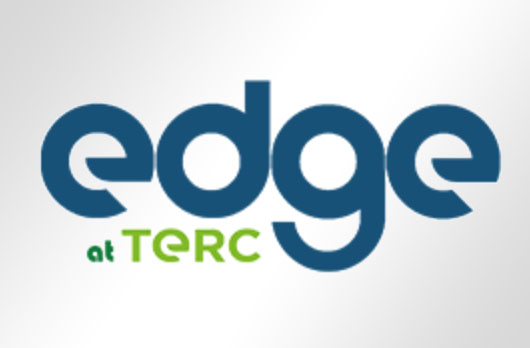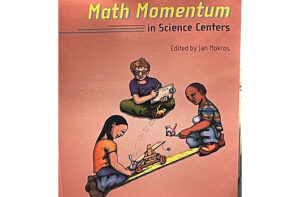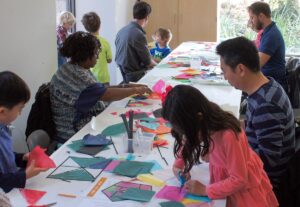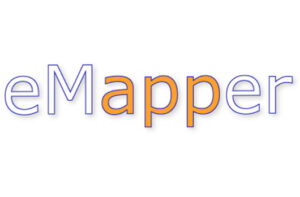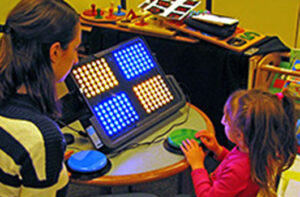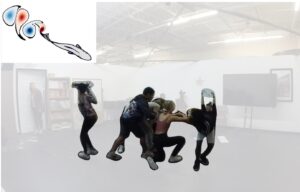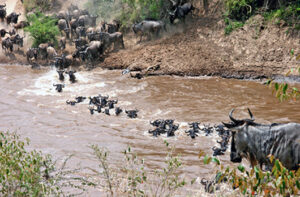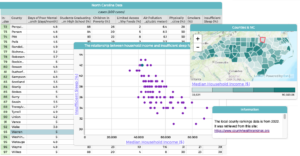Zoombinis Research
The Full Development Implementation Research Study of a Computational Thinking Game for Upper Elementary and Middle School Learners
Lead Staff:
Jodi Asbell-ClarkeElizabeth Rowe
Teon Edwards
Project Staff:
Erin BardarSantiago Gasca
SummaryComputational thinking is the set of ideas and practices considered vital for computer science skills and has been attracting increased attention over the past several years in K-12 education. The Logical Journey of the Zoombinis implementation research study examined the development of computational thinking for upper elementary and middle grades students.
This project leveraged the existing Zoombinis game by embedding tools for studying patterns of students’ decision-making and problem-solving in the environment. This allowed researchers to understand how students learn about computational thinking within a tool that bridged informal and formal learning settings to engage a wide variety of students.
The project also developed tools and resources for classroom teachers. The goal was to understand both students’ learning of computational thinking and how to bridge formal and informal learning via classroom implementation of the Zoombinis game.
Videos
Bridging from Zoombinis to Computational Thinking from videohall.com on Vimeo.
Research on Computational Thinking & the Game Zoombinis from videohall.com on Vimeo.
Research ActivityThe research examined three questions.
- What strategies do players develop during Zoombinis gameplay that may provide evidence of implicit computational thinking?
- How can teachers leverage implicit knowledge of computational thinking developed in Zoombinis to improve formal (explicit) learning?
- How can a large-scale commercial game be used for the broad and equitable improvement of computational thinking?
The research used and developed educational data mining techniques to assess students’ learning in conjunction with pre-post computational thinking assessments (external to the game), teacher interviews, classroom observations, and case studies of classroom use.
Presentations and PublicationsAlmeda, M., Asbell-Clarke, J., & Rowe, E. (2021, April 8-12). Differentiating between unproductive and productive persistence in an educational game using behavioral data. In I. Dahlstrom-Hakki (Chair), Remote Measures of Attention and Affect: Online Data Collection in the Age of COVID-19 [Symposium]. American Educational Research Association (AERA) Annual Meeting, Virtual. https://convention2.allacademic.com/one/aera/aera21/index.php?cmd=Online+Program+View+Paper&selected_paper_id=1682652&PHPSESSID=mssihe36e92lhrcc6tpd0jm0k0
Almeda, M. & Asbell-Clarke J. (2021). Scaffolding executive function in game-based learning to improve productive persistence and computational thinking in neurodiverse learners. In X. Fang (ed.), HCI in Games: Serious and Immersive Games. HCII 2021. Lecture Notes in Computer Science, vol 12790 (pp. 155-172). Springer. https://doi.org/10.1007/978-3-030-77414-1_12
Asbell-Clarke, J., Rowe, E., Almeda, M., Edwards, T., Bardar, E., Gasca, S., Baker, R., & Scruggs, R. (2021). The development of students’ computational thinking practices in elementary and middle-school classes using the learning game, Zoombinis. Computers in Human Behavior, 115, 1-14. https://doi.org/10.1016/j.chb.2020.106587
Show More
Show Less
Rowe, E., Asbell-Clarke, J., Almeda, M. V., Gasca, S., Edwards, T., Bardar, E., Shute, V., & Ventura, M. (2021). Interactive Assessments of CT (IACT): Digital Interactive Logic Puzzles to Assess Computational Thinking in Grades 3–8. International Journal of Computer Science Education in Schools, 5(2), 28-73. https://doi.org/10.21585/ijcses.v5i1.149
Rowe, E., Asbell-Clarke, J., & Almeda, M. Scruggs, R., Baker, R.S., Bardar,E. & Gasca, S. (2021). Assessing implicit computational thinking in Zoombinis puzzle gameplay. Computers in Human Behavior, 120. https://doi.org/10.1016/j.chb.2021.106707
Asbell-Clarke, J., Bardar, E., & Edwards, T. (2020). The importance of teacher bridging in game-based learning classrooms. In M. Farber (Ed.), Global perspectives on gameful and playful teaching and learning (pp. 211-239). IGI Global. https://doi.org/10.4018/978-1-7998-2015-4.ch010
Rowe, E., Asbell-Clarke, J., Almeda, M., Bardar, E., Baker, R., & Scruggs, R., (2020). Advancing research in game-based learning assessment: Tools and methods for measuring implicit learning. In E. Kennedy & J. Qian (Eds.), Advancing educational research with emerging technology (pp. 99-123). IGI Global. https://doi.org/10.4018/978-1-7998-1173-2.ch006
Almeda, M., Rowe, E., Asbell-Clarke, J., Baker, R., Scruggs, R., Bardar, E., & Gasca, S. (2019, October 3-5). Modeling implicit computational thinking in Zoombinis Mudball Wall gameplay. [Paper presentation]. Technology, Mind, and Society Conference, Washington D.C., United States. https://www.apa.org/members/content/2019-technology-mind-program.pdf
Almeda, M., Rowe, E., Asbell-Clarke, J., Bardar, E., & Gasca, S. (2019, October 3-5). Teachers leveraging game-based implicit STEM learning in classrooms. [Poster presentation ]. Technology, Mind, and Society Conference, Washington, D.C., United States. https://www.apa.org/members/content/2019-technology-mind-program.pdf
Edwards, E., Asbell-Clarke, J., Bardar, E., & Stidwell, P. (2019). Zoombinis. In K. Schrier (Ed.), Learning, education & games, volume 3: 100 games to use in the classroom & beyond (pp. 504-509). Carnegie Mellon University: ETC Press. https://doi.org/10.1184/R1/10557950.v1
Rowe, E., Asbell-Clarke, J., & Baker, R. (2019, April 5-9) Game-based measures of implicit learning [Poster presentation]. Structured poster session organized by Y.J. Kim titled Game-Based Assessment: How Has the Field Matured over the Past 10 years? AERA Annual Meeting, Toronto, ON, Canada. https://convention2.allacademic.com/one/aera/aera19/index.php?cmd=Online+Program+View+Paper&selected_paper_id=1435286&PHPSESSID=4487t0h3mpipemia
Rowe, E., Asbell-Clarke, J., Baker, R., Gasca, S., Bardar, E., & Scruggs, R. (2018, April 21-26). Labeling implicit computational thinking in pizza pass gameplay [Poster & paper presentation]. CHI Conference on Human Factors in Computing Systems, Montreal, QC, Canada. https://doi.org/10.1145/3170427.3188541
Rowe, E., Asbell-Clarke, J., Cunningham, K., & Gasca, S. (2017, August 14-17). Assessing implicit computational thinking in Zoombinis gameplay [Poster & paper presentations]. International Conference on the Foundations of Digital Games, Hyannis, MA, United States. http://fdg2017.org/
Rowe, E., Asbell-Clarke, J., Cunningham, K. & Gasca, S. (2017, October 15-18). Assessing implicit computational thinking in Zoombinis gameplay: Pizza Pass, Fleens, and Bubblewonder Abyss. [Poster & paper presentations]. ACM SIGCHI Annual Symposium on Computer-Human Interaction in Play, Amsterdam, Netherlands. https://dl.acm.org/doi/10.1145/3130859.3131294
Rowe, E., Asbell-Clarke, J., Gasca, S., & Baker, R. (2017, April 18-19). Computational thinking in Zoombinis gameplay. [Poster presentation]. Cyberlearning 2017: What’s Next? Making Connections to Shape the Future, Arlington, VA, United States. https://circlcenter.org/events/cyberlearning-2017/
Rowe, E., Asbell-Clarke, J., Gasca, S., & Baker, R. (2017, October 4-6). Computational thinking in Zoombinis gameplay. [Spotlight session – presentation] Digital Media & Learning Conference, Irvine, CA, United States. https://dml2017.dmlhub.net/
Shute, V. J., Sun, C., & Asbell-Clarke, J. (2017). Demystifying computational thinking. Educational Research Review, 22, 142-158. https://doi.org/10.1016/j.edurev.2017.09.003
Computational thinking is the set of ideas and practices considered vital for computer science skills and has been attracting increased attention over the past several years in K-12 education. The Logical Journey of the Zoombinis implementation research study examined the development of computational thinking for upper elementary and middle grades students.
This project leveraged the existing Zoombinis game by embedding tools for studying patterns of students’ decision-making and problem-solving in the environment. This allowed researchers to understand how students learn about computational thinking within a tool that bridged informal and formal learning settings to engage a wide variety of students.
The project also developed tools and resources for classroom teachers. The goal was to understand both students’ learning of computational thinking and how to bridge formal and informal learning via classroom implementation of the Zoombinis game.
Bridging from Zoombinis to Computational Thinking from videohall.com on Vimeo.
Research on Computational Thinking & the Game Zoombinis from videohall.com on Vimeo.
Research ActivityThe research examined three questions.
- What strategies do players develop during Zoombinis gameplay that may provide evidence of implicit computational thinking?
- How can teachers leverage implicit knowledge of computational thinking developed in Zoombinis to improve formal (explicit) learning?
- How can a large-scale commercial game be used for the broad and equitable improvement of computational thinking?
The research used and developed educational data mining techniques to assess students’ learning in conjunction with pre-post computational thinking assessments (external to the game), teacher interviews, classroom observations, and case studies of classroom use.
Presentations and PublicationsAlmeda, M., Asbell-Clarke, J., & Rowe, E. (2021, April 8-12). Differentiating between unproductive and productive persistence in an educational game using behavioral data. In I. Dahlstrom-Hakki (Chair), Remote Measures of Attention and Affect: Online Data Collection in the Age of COVID-19 [Symposium]. American Educational Research Association (AERA) Annual Meeting, Virtual. https://convention2.allacademic.com/one/aera/aera21/index.php?cmd=Online+Program+View+Paper&selected_paper_id=1682652&PHPSESSID=mssihe36e92lhrcc6tpd0jm0k0
Almeda, M. & Asbell-Clarke J. (2021). Scaffolding executive function in game-based learning to improve productive persistence and computational thinking in neurodiverse learners. In X. Fang (ed.), HCI in Games: Serious and Immersive Games. HCII 2021. Lecture Notes in Computer Science, vol 12790 (pp. 155-172). Springer. https://doi.org/10.1007/978-3-030-77414-1_12
Asbell-Clarke, J., Rowe, E., Almeda, M., Edwards, T., Bardar, E., Gasca, S., Baker, R., & Scruggs, R. (2021). The development of students’ computational thinking practices in elementary and middle-school classes using the learning game, Zoombinis. Computers in Human Behavior, 115, 1-14. https://doi.org/10.1016/j.chb.2020.106587
Show More
Show Less
Rowe, E., Asbell-Clarke, J., Almeda, M. V., Gasca, S., Edwards, T., Bardar, E., Shute, V., & Ventura, M. (2021). Interactive Assessments of CT (IACT): Digital Interactive Logic Puzzles to Assess Computational Thinking in Grades 3–8. International Journal of Computer Science Education in Schools, 5(2), 28-73. https://doi.org/10.21585/ijcses.v5i1.149
Rowe, E., Asbell-Clarke, J., & Almeda, M. Scruggs, R., Baker, R.S., Bardar,E. & Gasca, S. (2021). Assessing implicit computational thinking in Zoombinis puzzle gameplay. Computers in Human Behavior, 120. https://doi.org/10.1016/j.chb.2021.106707
Asbell-Clarke, J., Bardar, E., & Edwards, T. (2020). The importance of teacher bridging in game-based learning classrooms. In M. Farber (Ed.), Global perspectives on gameful and playful teaching and learning (pp. 211-239). IGI Global. https://doi.org/10.4018/978-1-7998-2015-4.ch010
Rowe, E., Asbell-Clarke, J., Almeda, M., Bardar, E., Baker, R., & Scruggs, R., (2020). Advancing research in game-based learning assessment: Tools and methods for measuring implicit learning. In E. Kennedy & J. Qian (Eds.), Advancing educational research with emerging technology (pp. 99-123). IGI Global. https://doi.org/10.4018/978-1-7998-1173-2.ch006
Almeda, M., Rowe, E., Asbell-Clarke, J., Baker, R., Scruggs, R., Bardar, E., & Gasca, S. (2019, October 3-5). Modeling implicit computational thinking in Zoombinis Mudball Wall gameplay. [Paper presentation]. Technology, Mind, and Society Conference, Washington D.C., United States. https://www.apa.org/members/content/2019-technology-mind-program.pdf
Almeda, M., Rowe, E., Asbell-Clarke, J., Bardar, E., & Gasca, S. (2019, October 3-5). Teachers leveraging game-based implicit STEM learning in classrooms. [Poster presentation ]. Technology, Mind, and Society Conference, Washington, D.C., United States. https://www.apa.org/members/content/2019-technology-mind-program.pdf
Edwards, E., Asbell-Clarke, J., Bardar, E., & Stidwell, P. (2019). Zoombinis. In K. Schrier (Ed.), Learning, education & games, volume 3: 100 games to use in the classroom & beyond (pp. 504-509). Carnegie Mellon University: ETC Press. https://doi.org/10.1184/R1/10557950.v1
Rowe, E., Asbell-Clarke, J., & Baker, R. (2019, April 5-9) Game-based measures of implicit learning [Poster presentation]. Structured poster session organized by Y.J. Kim titled Game-Based Assessment: How Has the Field Matured over the Past 10 years? AERA Annual Meeting, Toronto, ON, Canada. https://convention2.allacademic.com/one/aera/aera19/index.php?cmd=Online+Program+View+Paper&selected_paper_id=1435286&PHPSESSID=4487t0h3mpipemia
Rowe, E., Asbell-Clarke, J., Baker, R., Gasca, S., Bardar, E., & Scruggs, R. (2018, April 21-26). Labeling implicit computational thinking in pizza pass gameplay [Poster & paper presentation]. CHI Conference on Human Factors in Computing Systems, Montreal, QC, Canada. https://doi.org/10.1145/3170427.3188541
Rowe, E., Asbell-Clarke, J., Cunningham, K., & Gasca, S. (2017, August 14-17). Assessing implicit computational thinking in Zoombinis gameplay [Poster & paper presentations]. International Conference on the Foundations of Digital Games, Hyannis, MA, United States. http://fdg2017.org/
Rowe, E., Asbell-Clarke, J., Cunningham, K. & Gasca, S. (2017, October 15-18). Assessing implicit computational thinking in Zoombinis gameplay: Pizza Pass, Fleens, and Bubblewonder Abyss. [Poster & paper presentations]. ACM SIGCHI Annual Symposium on Computer-Human Interaction in Play, Amsterdam, Netherlands. https://dl.acm.org/doi/10.1145/3130859.3131294
Rowe, E., Asbell-Clarke, J., Gasca, S., & Baker, R. (2017, April 18-19). Computational thinking in Zoombinis gameplay. [Poster presentation]. Cyberlearning 2017: What’s Next? Making Connections to Shape the Future, Arlington, VA, United States. https://circlcenter.org/events/cyberlearning-2017/
Rowe, E., Asbell-Clarke, J., Gasca, S., & Baker, R. (2017, October 4-6). Computational thinking in Zoombinis gameplay. [Spotlight session – presentation] Digital Media & Learning Conference, Irvine, CA, United States. https://dml2017.dmlhub.net/
Shute, V. J., Sun, C., & Asbell-Clarke, J. (2017). Demystifying computational thinking. Educational Research Review, 22, 142-158. https://doi.org/10.1016/j.edurev.2017.09.003
The research examined three questions.
- What strategies do players develop during Zoombinis gameplay that may provide evidence of implicit computational thinking?
- How can teachers leverage implicit knowledge of computational thinking developed in Zoombinis to improve formal (explicit) learning?
- How can a large-scale commercial game be used for the broad and equitable improvement of computational thinking?
The research used and developed educational data mining techniques to assess students’ learning in conjunction with pre-post computational thinking assessments (external to the game), teacher interviews, classroom observations, and case studies of classroom use.
Almeda, M., Asbell-Clarke, J., & Rowe, E. (2021, April 8-12). Differentiating between unproductive and productive persistence in an educational game using behavioral data. In I. Dahlstrom-Hakki (Chair), Remote Measures of Attention and Affect: Online Data Collection in the Age of COVID-19 [Symposium]. American Educational Research Association (AERA) Annual Meeting, Virtual. https://convention2.allacademic.com/one/aera/aera21/index.php?cmd=Online+Program+View+Paper&selected_paper_id=1682652&PHPSESSID=mssihe36e92lhrcc6tpd0jm0k0
Almeda, M. & Asbell-Clarke J. (2021). Scaffolding executive function in game-based learning to improve productive persistence and computational thinking in neurodiverse learners. In X. Fang (ed.), HCI in Games: Serious and Immersive Games. HCII 2021. Lecture Notes in Computer Science, vol 12790 (pp. 155-172). Springer. https://doi.org/10.1007/978-3-030-77414-1_12
Asbell-Clarke, J., Rowe, E., Almeda, M., Edwards, T., Bardar, E., Gasca, S., Baker, R., & Scruggs, R. (2021). The development of students’ computational thinking practices in elementary and middle-school classes using the learning game, Zoombinis. Computers in Human Behavior, 115, 1-14. https://doi.org/10.1016/j.chb.2020.106587
Rowe, E., Asbell-Clarke, J., Almeda, M. V., Gasca, S., Edwards, T., Bardar, E., Shute, V., & Ventura, M. (2021). Interactive Assessments of CT (IACT): Digital Interactive Logic Puzzles to Assess Computational Thinking in Grades 3–8. International Journal of Computer Science Education in Schools, 5(2), 28-73. https://doi.org/10.21585/ijcses.v5i1.149
Rowe, E., Asbell-Clarke, J., & Almeda, M. Scruggs, R., Baker, R.S., Bardar,E. & Gasca, S. (2021). Assessing implicit computational thinking in Zoombinis puzzle gameplay. Computers in Human Behavior, 120. https://doi.org/10.1016/j.chb.2021.106707
Asbell-Clarke, J., Bardar, E., & Edwards, T. (2020). The importance of teacher bridging in game-based learning classrooms. In M. Farber (Ed.), Global perspectives on gameful and playful teaching and learning (pp. 211-239). IGI Global. https://doi.org/10.4018/978-1-7998-2015-4.ch010
Rowe, E., Asbell-Clarke, J., Almeda, M., Bardar, E., Baker, R., & Scruggs, R., (2020). Advancing research in game-based learning assessment: Tools and methods for measuring implicit learning. In E. Kennedy & J. Qian (Eds.), Advancing educational research with emerging technology (pp. 99-123). IGI Global. https://doi.org/10.4018/978-1-7998-1173-2.ch006
Almeda, M., Rowe, E., Asbell-Clarke, J., Baker, R., Scruggs, R., Bardar, E., & Gasca, S. (2019, October 3-5). Modeling implicit computational thinking in Zoombinis Mudball Wall gameplay. [Paper presentation]. Technology, Mind, and Society Conference, Washington D.C., United States. https://www.apa.org/members/content/2019-technology-mind-program.pdf
Almeda, M., Rowe, E., Asbell-Clarke, J., Bardar, E., & Gasca, S. (2019, October 3-5). Teachers leveraging game-based implicit STEM learning in classrooms. [Poster presentation ]. Technology, Mind, and Society Conference, Washington, D.C., United States. https://www.apa.org/members/content/2019-technology-mind-program.pdf
Edwards, E., Asbell-Clarke, J., Bardar, E., & Stidwell, P. (2019). Zoombinis. In K. Schrier (Ed.), Learning, education & games, volume 3: 100 games to use in the classroom & beyond (pp. 504-509). Carnegie Mellon University: ETC Press. https://doi.org/10.1184/R1/10557950.v1
Rowe, E., Asbell-Clarke, J., & Baker, R. (2019, April 5-9) Game-based measures of implicit learning [Poster presentation]. Structured poster session organized by Y.J. Kim titled Game-Based Assessment: How Has the Field Matured over the Past 10 years? AERA Annual Meeting, Toronto, ON, Canada. https://convention2.allacademic.com/one/aera/aera19/index.php?cmd=Online+Program+View+Paper&selected_paper_id=1435286&PHPSESSID=4487t0h3mpipemia
Rowe, E., Asbell-Clarke, J., Baker, R., Gasca, S., Bardar, E., & Scruggs, R. (2018, April 21-26). Labeling implicit computational thinking in pizza pass gameplay [Poster & paper presentation]. CHI Conference on Human Factors in Computing Systems, Montreal, QC, Canada. https://doi.org/10.1145/3170427.3188541
Rowe, E., Asbell-Clarke, J., Cunningham, K., & Gasca, S. (2017, August 14-17). Assessing implicit computational thinking in Zoombinis gameplay [Poster & paper presentations]. International Conference on the Foundations of Digital Games, Hyannis, MA, United States. http://fdg2017.org/
Rowe, E., Asbell-Clarke, J., Cunningham, K. & Gasca, S. (2017, October 15-18). Assessing implicit computational thinking in Zoombinis gameplay: Pizza Pass, Fleens, and Bubblewonder Abyss. [Poster & paper presentations]. ACM SIGCHI Annual Symposium on Computer-Human Interaction in Play, Amsterdam, Netherlands. https://dl.acm.org/doi/10.1145/3130859.3131294
Rowe, E., Asbell-Clarke, J., Gasca, S., & Baker, R. (2017, April 18-19). Computational thinking in Zoombinis gameplay. [Poster presentation]. Cyberlearning 2017: What’s Next? Making Connections to Shape the Future, Arlington, VA, United States. https://circlcenter.org/events/cyberlearning-2017/
Rowe, E., Asbell-Clarke, J., Gasca, S., & Baker, R. (2017, October 4-6). Computational thinking in Zoombinis gameplay. [Spotlight session – presentation] Digital Media & Learning Conference, Irvine, CA, United States. https://dml2017.dmlhub.net/
Shute, V. J., Sun, C., & Asbell-Clarke, J. (2017). Demystifying computational thinking. Educational Research Review, 22, 142-158. https://doi.org/10.1016/j.edurev.2017.09.003

Funder:
National Science Foundation
Award Number:
1502882
7/2018 – 2021 (Original Funding 7/2015)
Past ProjectThis project is no longer active. To see a list of current TERC projects, please click here.
Share This Page:
